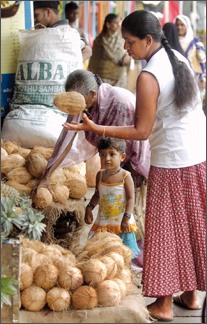|
Proven Sri Lankan solution - Part I:
Spiralling Cost of Living
Malady of UNP policies:
Garvin KARUNARATNE
Sky rocketing consumer goods is a concern for everybody. The
Rajapaksa Government has declared that it will win this economic war
too, now that the separatist terrorist outfit of Prabhakaran which was
threatening the very existence of this country has been annihilated.
 I would like to share my personal experience of the strategies used
by the past Governments through the Marketing Department and the CWE
mechanisms to control the spiralling costs of consumer goods, which
worked extremely well until the system was disjointed and dismantled and
sold to the private sector at the dictates of IMF/World Bank twins by
the post 1977 UNP Governments. I would like to share my personal experience of the strategies used
by the past Governments through the Marketing Department and the CWE
mechanisms to control the spiralling costs of consumer goods, which
worked extremely well until the system was disjointed and dismantled and
sold to the private sector at the dictates of IMF/World Bank twins by
the post 1977 UNP Governments.
I am of the opinion that restoring the Marketing Department mechanism
is essential to bring about increases in production, the creation of
employment and the alleviation of poverty.
It is true that the world market prices of certain essential
commodities has increased in recent years, but if the infrastructure
that Sri Lanka had before 1977 to combat high prices had been intact it
would have been possible to ensure that the increases were low.
Private traders
In my own words: The Department for Development of Agricultural
Marketing of the Fifties and Sixties ensured that prices of all
essential commodities were indirectly controlled and the traders were
compelled to offer fair prices to the producers and shop keepers were
compelled to sell at fair prices to the consumers. (How the IMF Ruined
Sri Lanka? (Godages) This was done in a very shrewd manner by the
Government too buying from producers and selling the goods to consumers
in the cities. When the Marketing Department competed with the traders
and offered the commodities to consumers at very low rates, the Private
Sector traders too had to offer goods to consumers at similar rates if
they were to be in business.
The Marketing Department, as the Department for Development of
Agricultural Marketing was generally called, was actually unofficially
controlling the prices at which producers sold as well as the price that
prevailed in the cities.
Marketing Department
The working of the Marketing Department was a thorn in the neck of
the private traders because it effectively limited the profit they could
make in trading.
The IMF believed in Free Market Economics and it was anathema for the
Government to interfere with any economic activity. This was the
Structural Adjustment Program of the IMF in action.
The IMF called for Liberalization and de-regulation? De-regulation
has meant that the power of regulation has gone out of the sovereign
country into the hands of Trans National Corporations, private investors
and private importers. (Microenterprise Development, Sarasavi, pg.22).
In the Pre-1977 Period it was Assistant Commissioners under the
guidance of the Ministers that made every decision- like what to import,
prices etc. while after 1977 this role was taken over by the salesmen of
private companies- their main attempt being to maximize profits. Thus
the spiralling costs of consumer goods today is a malady created by post
1977 UNP policies. Fortunately, President Rajapaksa does not have to
search far and wide, because the Marketing Department mechanism was
practiced by the Governments of his own party up to 1977.
All that we had built, the systems, machinery, infrastructure, and
price control systems were systematically dismantled by the UNP of the
Jayewardene Era in the name of the open economy. The theory was that the
Government should not handle trade and that it should be left to the
Private Sector to handle it as they like.
The difference was that when the Government Departments handled trade
- be it in vegetables - fruits-milk- fish, the motive was to serve the
public.
 |
|
UNP the architect of soaring consumer
prices. File photo |
In trading the motto was to keep the lowest possible margin that
would cover handling and transport. In the case of the Private Sector
the motive was to keep a profit and serving the people was of secondary
concern.
UNP propaganda distorting facts
Thus, the UNP is the culprit and architect of the high Cost of Living
and soaring prices of consumer goods of the country. It is ludicrous
therefore now, that they themselves turn back and shout at the present
Government for high cost of prices of consumer goods.
UNPers lead by Ranil Wickremesinghe should look up themselves in the
mirror to find the real culprits. Instead, the current Government of
President Rajapaksa is blamed for increases in prices of essential
commodities by the so-called free media. It is the natural tendency to
blame the party in power and all the anger of the people are generally
let loose on the Government.
In this context it is necessary to understand that the Pre 1970
United National Party was a nationalist party that looked after the
people while the Post 1977 UNP Governments were selling the country to
the IMF, to Western Imperialists and to the rich of the country.
The Private Sector of the country was allowed to keep any profit in
handling local produce or imports. The motto of the rich was to get rich
fast and the people had to suffer in silence. The UNP of the Post 1977
Era ran Sri Lanka for the rich of the country - charged the least income
tax from high earners - even less than what the UK charges, offered
unrestricted foreign exchange for the rich, even borrowing foreign
exchange at high interest for this purpose, built up a system of
international schools for the children of the rich and allowed the rich
to live in the lap of luxury, while the masses lingered within the realm
of poverty.
Farmgate Vs Colombo price
It is true that prices of certain items are exorbitant today. I am
told that a kilo of beans at Narahenpita Economic Centre was as high as
Rs 90. I was in Sri Lanka in February and did travel to Kataragama and
also to Mahiyangana via Randenigala.
The prices in the remote rural areas are very low while in the cities
the prices are very high.
On the way to Mahiyangana I spotted a lorry being loaded with crates
of tomatoes and the price was Rs 40 a kilo. If I offered spot cash, I
could have purchased it for less. It was been dispatched to Colombo and
payment would be weeks later.
Back in Colombo the price of a kilo was never below Rs 80 a massive
100 percent profit. This unfortunately is a global phenomenon.
In 2009 I toured Spain and bought a bag of satsumas at a farmgate for
a single Euro. In the nearby Supermarkets the price was four Euros- a
mark up of 400 percent. In California the trees are laden with lemons
and oranges and there is no system of selling at the farmgate. However
an orange is sold at around thirty cents in the Supermarkets.
If the Sri Lankan Marketing Department mechanism is functional in
California, many people can earn a living by selling oranges and the
Supermarkets will have to reduce their prices.
Marketing Dept with its non profit motive as the middleman
However there is a difference up to 1977 as far as Sri Lanka is
concerned.
This is because Sri Lanka is the only country in the world that had
the development infrastructure in place to ensure that the producer gets
a fair price and simultaneously for the consumer to get the same goods
at a reasonable price.
To get to basic facts that system enabled the producer near
Mahiyangana to get paid at Rs 40 a kilo for tomatoes and also enabled
the consumer in Colombo to get it at Rs 50 or Rs 55 a kilo. This was in
a nutshell, the Department for Development of Agricultural Marketing at
work.
|



